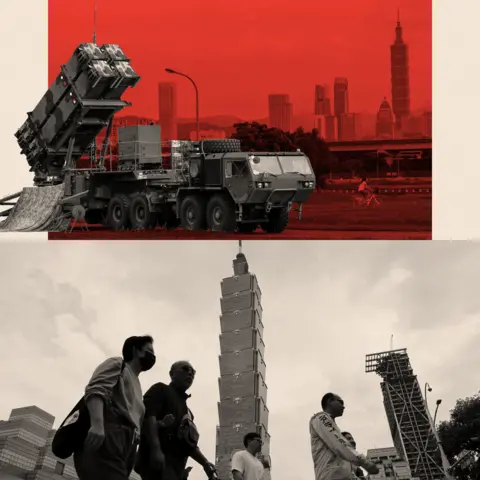How Taiwan is preparing for a Chinese attack with acting, fake blood and mock missile strikes
It was just another Friday morning on the Taiwanese island of Kinmen, a few kilometres from the coast of China, when an air raid siren pierced the calm.
At a local government office, people switched off their lights and dove under tables. Others fled to an underground car park. At a nearby hospital, staff rushed to treat people staggering in with bloody injuries.
But the blood was fake, and the casualties were volunteer actors. Together with the government workers, they were taking part in mandatory civil defence and military drills held across Taiwan last month.
The purpose? Rehearsing their response to a possible attack by China.

China has long vowed to reunify with self-governing Taiwan and has not ruled out the use of force. It is a threat that Taiwan is increasingly taking seriously. President William Lai, who took office last year, is behind one of the strongest pushes in years to strengthen defence.
One of his biggest challenges, however, is convincing his own people of the urgency. While his defence drive has garnered support, it has also sparked controversy.
Like Ben, most people in Taiwan – 65% according to a survey released in May by the military-affiliated Institute for National Defense and Strategic Research (INDSR) – believe it is unlikely that China will attack in the next five years.
This is despite the US warning that the threat to Taiwan was imminent and that Beijing is readying its military to be capable of invading by 2027.
Taiwan's military preparations
Lai and his government often repeat a particular phrase to explain what is driving them: By preparing for war, we are avoiding war. They have stressed that they are not seeking conflict but exercising Taiwan's right to build up its defences.
Following a lengthening of its mandatory conscription programme, Taiwan has now increased pay and benefits for the military, and introduced more rigorous training. These measures are aimed at addressing the perennial problems of troop shortages and low morale.
Practice evacuations, raids and rescues
One of the largest ever, called the Urban Resilience Exercise, was held last month. Over several days, every major urban area across Taiwan took turns to hold air raid drills. Residents in designated districts had to head indoors, while hotels, shops and restaurants had to pause business.



















